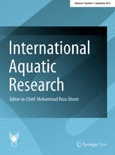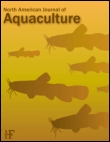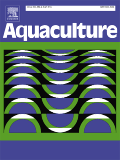
ISRAELI JOURNAL OF AQUACULTURE-BAMIDGEH
metrics 2024
Fostering collaboration and knowledge in the aquaculture community.
Introduction
Welcome to the Israeli Journal of Aquaculture-Bamidgeh, published by AquacultureHub Inc, a pivotal platform dedicated to advancing the field of aquaculture studies since its inception in 1988. With a focus on innovative research and practical applications within the realms of Agronomy and Aquatic Sciences, this journal has established a reputation for disseminating high-quality findings that contribute to sustainable practices in aquatic farming. The journal, although classified in the Q3 and Q4 quartiles for its respective categories, offers valuable insights for researchers and practitioners alike, allowing them to stay abreast of developments in aquaculture challenges and solutions. While it's currently not an Open Access journal, the Israeli Journal of Aquaculture-Bamidgeh is committed to providing a thorough avenue for scholarly exchange and fostering collaborations across the global aquaculture community. Explore impactful studies and the latest trends to enhance your knowledge and research in this vital sector.
Metrics 2024
 0.21
0.21 0.50
0.50 0.60
0.60 34
34Metrics History
Rank 2024
Scopus
IF (Web Of Science)
JCI (Web Of Science)
Quartile History
Similar Journals

Journal of Ichthyology
Championing Conservation Through Ichthyological InsightsJournal of Ichthyology, published by PLEIADES PUBLISHING INC, is a respected periodical in the field of aquatic sciences and biological studies, focusing extensively on the study of fish and their ecosystems. With an ISSN of 0032-9452 and E-ISSN of 1555-6425, this journal serves as an essential platform for researchers seeking to publish innovative findings related to ichthyology and broader aquatic biological sciences. Although currently not an open-access journal, its high relevance is reflected in its impact factor and varied audience, addressing pressing issues in biodiversity, conservation efforts, and fish biology. The journal's classification indicates a Q3 ranking in Agricultural and Biological Sciences and a Q4 ranking in Aquatic Science for 2023, affirming its contributions to the field despite its percentile standings in Scopus ranking. The journal has a publication history that spans critical converged years from 1976 to 2024, making it a vital resource for ongoing research developments and scholarly discourse. For academics, professionals, and students alike, the Journal of Ichthyology remains a key resource for advancing knowledge and enhancing the understanding of fish biology and their ecological impacts.

International Aquatic Research
Exploring the depths of aquatic science and innovation.International Aquatic Research, published by the Islamic Azad University, Tonekabon Branch, is a vital open-access journal dedicated to advancing the field of aquatic sciences since its inception in 2009. With an ISSN of 2008-4935 and an E-ISSN of 2008-6970, the journal plays a significant role in disseminating high-quality research findings from Iran and around the globe. It covers a broad range of topics in aquatic biology, fisheries science, and marine ecology, making it a valuable resource for researchers, professionals, and students alike. As of 2023, it ranks in the third quartile (Q3) of the aquatic science category with a Scopus rank of #138 out of 247 in Agricultural and Biological Sciences, reflecting its growing influence in the field. With a commitment to promoting scientific knowledge and fostering collaboration among aquatic research communities, International Aquatic Research is positioned as an essential platform for those dedicated to understanding and conserving marine and freshwater environments.

FISH PHYSIOLOGY AND BIOCHEMISTRY
Exploring the Depths of Aquatic ScienceFISH PHYSIOLOGY AND BIOCHEMISTRY, published by Springer, is a leading journal in the fields of aquatic science, biochemistry, and physiology, with an impressive trajectory since its inception in 1986 and continuing through 2024. Operating from the Netherlands, this journal serves as a vital platform for researchers, professionals, and students alike, showcasing innovative studies that explore the physiological and biochemical aspects of fish, contributing significantly to our understanding of aquatic ecosystems and their inhabitants. With a robust impact factor reflected in its Q1 status in Aquatic Science and notable rankings in other relevant categories, FISH PHYSIOLOGY AND BIOCHEMISTRY maintains a strong scholarly influence, evidenced by its Scopus ranking within the top quartiles of various biological sciences disciplines. While the journal does not currently offer open access options, it remains a cornerstone for advancing knowledge and fostering collaboration within the community dedicated to aquatic biology and related fields.

Water Biology and Security
Transforming water science into actionable knowledge.Water Biology and Security, published by KEAI PUBLISHING LTD, is a pivotal open-access journal that has been addressing critical issues in the interdisciplinary fields of water sciences, aquatic biology, and environmental sustainability since its inception in 2022. With an E-ISSN of 2772-7351 and a distinguished ranking within the top quartile (Q1) of several categories including Agricultural and Biological Sciences, Animal Science and Zoology, Aquatic Science, and Water Science and Technology, the journal stands out as a leading platform for innovative research. Based in Beijing, China, and supported by an impressive impact factor derived from its Scopus rankings, the journal aims to disseminate high-quality and impactful research that addresses the challenges related to water resources and ecosystems. Its open-access format enhances accessibility, ensuring that vital information reaches policymakers, practitioners, and scholars worldwide. As we converge through 2024, the journal aspires to foster a vibrant scholarly community, facilitating dialogues that inform practice and advance the scientific understanding of aquatic environments.

BULLETIN OF THE EUROPEAN ASSOCIATION OF FISH PATHOLOGISTS
Pioneering Research in Aquatic Pathology.BULLETIN OF THE EUROPEAN ASSOCIATION OF FISH PATHOLOGISTS is a leading journal dedicated to advancing research and knowledge in the field of fish pathology, published by the European Association of Fish Pathologists. With its ISSN number 0108-0288, this journal has consistently contributed to the academic landscape since its inception in 1996. Based in the United Kingdom, this journal is recognized for its high-quality research output, holding a commendable Q2 ranking in both Aquatic Science and Small Animals categories as of 2023. The Scopus rankings further reflect its impact, notably securing a 10th rank in Veterinary Small Animals, showcasing its relevance and influence in the field. Although it does not offer Open Access, the content remains vital for researchers and practitioners invested in addressing the challenges associated with fish health and pathogens. The journal serves as a critical platform for sharing innovative studies, fostering collaborations, and informing ongoing developments in aquatic science. Its commitment to maintaining high standards ensures that it remains an essential resource for professionals, researchers, and students alike in pursuit of knowledge on fish pathology and aquatic health.

NORTH AMERICAN JOURNAL OF AQUACULTURE
Navigating the future of aquaculture with scholarly insights.North American Journal of Aquaculture, published by Wiley, is a premier resource in the field of aquatic science, dedicated to advancing knowledge and research in aquaculture practices across North America. With an ISSN of 1522-2055 and E-ISSN of 1548-8454, this journal serves as an essential platform for researchers, industry professionals, and students focusing on sustainable practices, species cultivation, and aquatic ecosystems. Notably, it ranks in the Q3 category in Aquatic Science according to the 2023 metrics, and stands at the 135th position out of 247 in the Scopus rankings for Agricultural and Biological Sciences—Aquatic Science, reflecting its contribution to the field. As the journal continues to evolve through its converged coverage from 1999 to 2024, it remains committed to disseminating impactful research while providing open access options to facilitate broad readership and engagement. The North American Journal of Aquaculture aims to inspire innovative solutions for the aquaculture sector while fostering a collaborative environment for aquatic science research.

BOLETIM DO INSTITUTO DE PESCA
Catalyzing dialogue on aquatic resource sustainability.BOLETIM DO INSTITUTO DE PESCA, published by the Instituto Pesca, is a Brazilian journal dedicated to advancing the fields of Animal Science and Aquatic Science. With its Open Access policy adopted in 2008, the journal ensures that research is widely disseminated, fostering collaboration and innovation among researchers, professionals, and students alike. Despite its recent Q4 category rankings in the 2023 metrics for both disciplines, the journal plays a vital role in providing a platform for emerging studies and critical discussions related to aquatic ecosystems and fisheries management. Covering a wide range of topics within its scope, BOLETIM DO INSTITUTO DE PESCA publishes original research, reviews, and case studies, stimulating academic dialogue and contributing to the sustainable management of aquatic resources in Brazil and beyond. This journal is an essential resource for anyone invested in marine and freshwater biology, ecology, and conservation.

INDIAN JOURNAL OF FISHERIES
Bridging knowledge gaps in fisheries management.Welcome to the Indian Journal of Fisheries, an esteemed publication of the Central Marine Fisheries Research Institute, dedicated to advancing the field of aquatic sciences. Established in 1974, this journal serves as a crucial platform for researchers, professionals, and students interested in the dynamics of fishery research within the Indian context and beyond. With an impact factor highlighting its rigorous peer-review standards, the journal publishes research that significantly contributes to the understanding of fisheries management, conservation, and sustainable practices. Although currently categorized in Q4 for Aquatic Science (2023) and ranked #215 out of 247 in Scopus, its increasing visibility demonstrates the journal's dedication to enriching the scientific discourse surrounding aquatic ecosystems. Located in Kochi, India, and published intermittently from 1977 to 2024, it seeks to bridge knowledge gaps while promoting innovative methodologies in fishery sciences. While not an open-access journal, it fosters a vital exchange of scholarly work that informs fishing practices, policy, and ecological considerations vital to both national and global fisheries. Join us in exploring the intricate world of fisheries through our comprehensive collection of research articles, reviews, and case studies.

ENVIRONMENTAL BIOLOGY OF FISHES
Unveiling the secrets of fish ecology and behavior.ENVIRONMENTAL BIOLOGY OF FISHES, published by SPRINGER, is a premier journal in the fields of Aquatic Science and Ecology, Evolution, Behavior and Systematics. With a rich history spanning from 1976 to 2024, this esteemed journal provides a platform for groundbreaking research that addresses critical issues such as fish ecology, species behavior, and environmental influences on aquatic life. Recognized for its significant contributions, it holds a Q2 ranking in both the Aquatic Science and Ecology categories, reflecting its influence and relevancy in the academic community. The journal's focus on innovative ecological studies makes it an essential resource for researchers, professionals, and students dedicated to advancing our understanding of fish biology and the broader ecological systems of which they are a part. Although not an open-access publication, the insights and findings presented in its articles are invaluable for those engaged in the preservation and sustainable management of aquatic environments.

AQUACULTURE
Exploring the depths of aquatic biology and technology.AQUACULTURE is a premier academic journal dedicated to the field of aquatic science, published by Elsevier. With a robust Impact Factor, the journal is renowned for its significant contributions to aquatic biology and the sustainable development of aquaculture practices. Since its inception in 1972, AQUACULTURE has established itself as an essential resource for researchers and professionals in the industry, regularly ranked in the Q1 category of aquatic science journals and positioned in the 14th percentile of its field according to Scopus rankings. Covering a wide array of topics including fish biology, aquaculture technology, sustainable practices, and environmental impacts, AQUACULTURE aims to disseminate innovative research findings that drive the industry forward. The journal, accessible to a global audience from its base in the Netherlands, continues to foster collaboration, discussion, and application of research to both academic and practical realms within aquaculture. Researchers and students alike will find valuable insights and current trends in this highly respected publication.